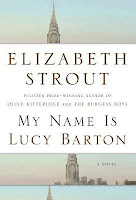Book Review: My Name Is Lucy Barton by Elizabeth Strout (Amgash #1)
My Name Is Lucy Barton begins with our narrator, Lucy Barton sharing details about how in New York City in the 1980s, an infection after routine surgery for removing her appendix leads to her being hospitalized for nine weeks. Her estranged mother, whom she hasn’t seen for years, travels to New York City from Amgash, Illinois and stays with her for five days, never leaving her bedside. Her mother’s presence triggers Lucy’s memories of her past, inspires her to reflect on her present and motivates her to contemplate her future.
“This must be the way most of us maneuver through the world, half knowing, half not, visited by memories that can’t possibly be true.”
Lucy’s childhood was one marked by abject poverty and abuse. Dysfunctional family dynamics, no friends and being looked down upon by her peers on account of her family’s poor living conditions (her family in the garage of a relative till the age of eleven), push her to concentrate on her books and academics, an endeavor results in her winning a scholarship to college. She is able to make a good life for herself away from the bleak memories of her past. Given her humble beginnings and unhappy childhood, Lucy is sensitive to how other people treat her. She acknowledges and remains grateful for even the smallest gestures of kindness she has experienced from teachers, neighbors and others in the course of her life. Lucy's relationship with her mother is complicated. They have been estranged for years and her mother is now at her bedside after Lucy's husband calls her. Her mother's bedside conversations revolve around news and gossip about cousins, neighbors and other people in their hometown. Though Lucy does bring up more personal topics including her accomplishments as a writer having recently published two stories, her mother does not engage in any deep discussion of Lucy’s childhood or openly appreciate her accomplishments as an adult. The visit is short and her mother abruptly decides to leave after five days. It is not as if mother and daughter reconcile or suddenly become close friends, but there is no denying the fact that Lucy loves her mother deeply and her mother does care for Lucy. Lucy craves affection from her mother, and though her mother remains reserved in her demeanor in this regard, this visit impacts Lucy’s life in that her mother’s presence, the sound of her voice and even the moments spent in silence provide Lucy with comfort and enable her to confront her own emotions, also reflecting on her own role as a mother of two daughters and take stock of her marriage which isn’t exactly perfect. Families are complicated and mother-daughter relationships can be more so and the author does a magnificent job is exploring the same through Lucy and her mother. Love might not always be expressed or may be expressed in a manner different from what we may be able to comprehend, which is painful – but that does not mean it is not there.
“ Because we all love imperfectly.”
Elizabeth Strout’s My Name Is Lucy Barton is a short but impactful novel. The author’s prose is simple yet beautiful and elegant. Though Lucy’s memories are shared through a series of non-linear, often disjoint flashbacks, the author manages to paint a beautiful picture of Lucy's life. In Lucy Barton, the author creates an emotional but resilient character who feels real and relatable. This is a beautifully written story, concise, with a fluid narrative and superb characterization. I’d been planning to read this book ever since its release in 2016 but have been procrastinating. I’ve always believed in the cathartic effect that reading the right book at the right time could have on you. I found this to be a moving and thought-provoking read that struck a personal chord with me and I am glad I finally picked it up. I look forward to reading Elizabeth Strout’s other books featuring Lucy Barton.
“But I think I know so well the pain we children clutch to our chests, how it lasts our whole lifetime, with longings so large you can’t even weep. We hold it tight, we do, with each seizure of the beating heart: This is mine, this is mine, this is mine.”

Comments
Post a Comment